Divided Individuals
The Eternal Internal Struggle
Who's that?
I wake up. I'm the only one left in the facility. I’m not relieved of my duties though. So I get out of bed and begin my morning routine. This day is exactly like the thousands that came before it—there are minor differences, sure, different problems to solve, but essentially, the same.
Except it's not.
As I'm traveling out in my vehicle to service one of the relay stations, the computer that drives my vehicle encounters a fatal error and suddenly collapses. It happens so fast I don't even have time to register the gravity of this failure. It's also completely unexpected. My mind tells me that what this means is I'm stuck out here. Like really stuck. I can't get back to the station with the oxygen in my suit; I'll never make it. I'm going to die out here, and no one will ever know. Well the computers that run the station will discover that I'm not performing my duties any more, and will inform command, and they'll inform my family. But they'll never know why or how I died. It seems so callous.
Then the full weight of this tragedy hits me like the Titanic. I’m overwhelmed by sadness, so much that I can’t breathe. I weep and weep for what seems like hours. But surprisingly, after a while, I realize that there's absolutely nothing I can do. So I accept my fate. I come to terms with it. I wipe the moisture from my cheeks and I settle in. I slowly get more and more tired as the oxygen levels in my vehicle deplete. I fall asleep, probably for the last time.
I wake up. I'm the only person still here in the facility. My duties don't stop though. So I get out of bed and begin my morning routine. This day is a carbon copy of the thousands before it—there are minor differences, sure, little details that vary from day to day, but essentially, this day will be the same.
Except it's not.
As I'm traveling out in my vehicle to service one of the relay stations, I notice another vehicle already there. It looks like it crashed. I've never seen this before... what the hell is going on?! I didn't even know there were other vehicles.
I change into my suit and step outside into the atmosphere. I can make a brief EVA like this, but I cant stay outside long. I'd never make it back to station at this distance. So then I climb up the exterior of the other vehicle... whose vehicle is this? I thought I was the only one left in the facility. As I scramble onto the top, I open the hatch, and descend the ladder into the cockpit. And then I see it—another cosmonaut. He.. or she... or whatever IT is, is still suited up, and I can't see... its... face. But it’s clearly not responding to me, or breathing at all. So I pick it up and carry it with me back outside, then into my vehicle. Luckily the gravity here is lighter, otherwise this would be impossible.
I floor it back to station, rush inside, and throw the body on the medical table. I unzip the hood and my stomach drops through the floor. My heart is literally pounding against my sternum, about to break outside my body. I can't believe my eyes. I must be hallucinating. This can’t be real.
The person in the suit is...
...me.
It doesn't make any sense. I don't have a twin. I've been here for five years and never seen a single soul. Command never told me anything about any other person. It's just me here. It's just me. It’s just…
Or is it?
Then the question hits me: Wait, is this my clone?
Or... Oh my god…
Am I a clone?
…
What the hell is going on ?!
Spl/it
The story above is the premise of one of my favorite movies, Moon (2009), starring Sam Rockwell and Kevin Spacey.
In Moon, the main character, Sam, is able to resuscitate the other astronaut he found, who turns out to be his clone (or he’s the other one’s clone). You might think that this would be cool if it happened to you, as you would easily have found your new best friend.
But you would probably also have met your own worst enemy.
In Moon, the two Sams are immediately skeptical of each other. Who’s the real one? Who gets to decide what to do? They don’t become best friends; instead they fight and argue and struggle with each other for dominance. It’s extremely interesting to watch, and, I imagine, it was also very challenging to act.
I won't spoil the rest of the movie, because I think it's fantastic, and I think you should see it, even if you don't like science fiction stories. I say this because it deals with a topic that we all have experience with, but don't talk about often enough—the battle against our own selves.
Have you ever broken a promise to yourself? Given up on your new year's resolution? Tried to start a new habit (or stop one), but when the going gets tough, just give up? Change your mind. Realize you bit off more than you can chew. Reach exceeded your grasp. Eyes bigger than your stomach. Too much ambition when you drew up the plans, and while it seemed good on paper, the actual doing of thing was very different.
Here's a perfect example: writing this newsletter. Today is week 12 of publishing every Wednesday, but I've been writing for closer to 200 weeks. Has it been consistent? Absolutely not. If I had a nickel or a penny for every time I set a goal for myself to write x minutes every day, or publish x essays every month, and then failed to fulfill that goal… let's just say I would need to rent a Uhaul truck to take all the loose change to the bank.
Another example: I absolutely love making YouTube videos. Well, the idea of it. I have so many grand visions for videos that I could be the Christopher Nolan of YouTube... if only I could actually execute on those ideas.
In fact the process of making videos is incredibly onerous for me. So I have striven and failed countless times to make those visions a reality. (Maybe, hopefully, AI will make this a lot easier). Again, the idea of becoming a youtuber seemed great in the laboratory, in the sterile environment of theories and experiments and test tubes, and the analytical scientist part of me thought it was an excellent plan. Foolproof. But in the actual trenches, in the real world where dirt and grime and mush are prevalent, and there’s not a clean spot in sight, the soldier part of me who actually has to fulfill the plans realizes that the nerd in the lab coat is totally disconnected from reality. And that he’s going to get us killed.
So I abandon my best laid plans. And then I regret it, and wonder why I didn’t stick with it longer. And I get mad at myself. And then I make new plans, and renege on them, and regret it, and chastise myself, and so on.
We all do this, but the question is "Why?"
I think most people can relate to what Paul said 2,000 years ago:
How many times have you failed to fulfill the plans you made for yourself? That exercise, that chore, that kind gesture, that assignment. Even when you knew deep down that it was the right thing to do. You really wanted to do it... but then you didn't. And then you feel bad about it afterwards. And you wonder how you can seemingly have two different reactions to the same thing. Part of you desperately wants to do it, part of you absolutely hates to do it.
And we feel divided not only in trying to make or break habits, or completing the plans we've made for ourselves—but we've also all experienced this in social contexts, particularly with regard to dating. How many times have you wanted to tell someone something, but when the time came, the words seemed get lost? You wanted to tell your boss that you need a raise, or your friend that she has spinach in her teeth, or the stranger at the grocery store that you like his shoes. But it's the worst when it comes to flirting.
You're sitting there and you see a cute person sitting right next to you, and you desperately want to talk to them, but your body somehow fails you. You want to move your lips to say something, anything, but you feel frozen, paralyzed, mouth sewn shut, unable to do that very thing you most want to do.
And if somehow, by some miracle, by a heroic show of your bravery, you finally work up the nerve to finally speak to that person, your brain totally fails you, and you say something stupid, or embarrassing, or you just totally swallow your words and only indecipherable sounds blurt out. And then you spill your drink. On them.
Excellent work. A+
It can be infuriating. It feels like you were betrayed by your own body. Or if not your body, then some other part of the mind. Some other person entirely. It feels like an attack1.
One last example, perhaps the one that bothers me the most—as I’m working on a project during the day, I get sleepy, feel lethargic, and don't have the energy to focus. I can't even sit up straight in my seat. So that project goes unfinished. I feel like the day was a complete waste.
Then the real kicker— I get home after a long, exhausting day, collapse into my bed, and then all of a sudden, my mind starts turning. It won't stop. I feel an inexplicable burst of energy. And now I can't fall asleep no matter how hard I try.
So I’m tired when I least want to be, and not tired when I most want to be. WTF?!
Jekyll and Hyde
Why does this happen to us? It makes sense fights can break out between a couple of lovers, because they are two separate people, each with their own goals, desires, fears, interests, disinterests. Same thing for a group of friends, or a team of colleagues at work, or the entire voting-age population of a nation.
But individuals? Doesn't the very word mean that we cannot be divided any further? A singular, self-contained entity? And yet our own experience of reality doesn't feel like this at all. In fact, it feels more like a jury of twelve angry men, debating ad nauseum every single trifling decision. Even commitments that we've had a unanimous approval on—why are we still arguing over them? Why?!
Above: an MRI of my brain, at 1,000x magnification
Perhaps there is a difference between the Experiencing Self and the Remembering Self:
The Experiencing Self lives only in the present, and knows nothing about the past nor the future.
The Remembering Self lives only outside the present, reflecting on the past and making plans for the future.
The Experiencing self is the one who wants to eat the entire cake, but the Remembering self knows that is bad for us, and that it makes us feel sick.
The Remembering self made plans to go to the gym for 30 minutes today and to get in shape, which it knows will make us feel better, but the Experiencing self is the one who actually has to put their feet on the treadmill and go the distance, and honestly, just isn't feeling it today.
Who wins? It really depends.
But perhaps the divide is elsewhere in the person, and I'm cutting it the wrong way. There are countless paradigms that attempt to explain this internal conflict:
The Ego vs. the Superego vs. the Id
The Persona vs. the Shadow
Body vs. Mind vs. Soul
The Flesh vs. the Spirit
Left brain vs. Right brain
The Elephant vs. the Rider vs. the Path
Logos vs. Pathos vs. Ethos
Chaos (Yin) vs. Order (Yang)
Thinking Fast vs. Thinking Slow
And so on...
The sheer number of examples only proves that it is an essential facet of our human nature—we are divided individuals. We battle against ourselves, however the battle lines may be drawn. The biggest enemy we will ever face is not out there, but in here.
And it's not just Moon; there have been many movies that have portrayed this internal conflict. One common example is the how Hollywood has covered the psychological phenomenon of multiple-personalities (now called Dissociatve Identity Disorder, DID): Sybil, Fight Club, The Three Faces of Eve, Primal Fear, Identity, Split, Secret Window, Shutter Island, Psycho, The Machinist, Black Swan, and so on.
But DID is a real mental condition that real people suffer (though rare), and it is significantly different from how we experience our own internal conflicts. For one, we don’t actually hallucinate other people.
There are other movies too2, that deal with struggles to subdue the imposter within. Perhaps one of the best examples I can think of is A Beautiful Mind, in which the main character must come to terms with his hallucinatory projections and realize that all his conspiracy theories are just that. Truly, the entire movie is one long titanic struggle to conquer his own mind, which is trying to incessantly trying to mislead him, away from his family, his friends, his work, his life.
But nothing comes close to how Moon illustrates this phenomenon of inner conflict, because of how jarring it is to truly see two copies of the same person fighting with each other. It’s just so unusual that it brings the issue to the forefront and forces us to really think about it how it plays out in our own lives.
Confederacy of Selves
But regardless of which of the paradigms above you choose to utilize (I think they are all valuable, in their own way), it’s important to remember one thing: they are all about balance.
There's a term that I like to use to remind myself of this principle, I call it "The Confederacy of Selves.3" The point is that, I may think I'm an autonomous individual, but I'm actually a committee of about 10-15 different people, depending on the day, and who showed up, who's late, who's sick, and who's really got something they want to announce today. And so, like any other meeting, I have to negotiate. Or rather—we have to negotiate. We have to figure out what's the best solution, for all of us. And we will probably have to reconvene frequently. Because often, what seems good in the conference room turns out to be really difficult for whoever's on duty at the time.
Reminding myself that it's a negotiation, that it's a democracy, helps me to understand what’s happening when I get a funny feeling that tells me my plans are all wrong. The voice that whispers to me that talking to that pretty girl is a stupid idea and a recipe for getting rejected and mocked by everyone in the room and shunned by the community. Or that talking to my boss about that raise will instantly get me fired and I’ll be out on the streets begging for my next meal. Or that writing these essays is a complete waste of time and effort and no one cares and I'm a total hack and I’d much rather justto play video games instead.
Knowing about the Confederacy of Selves allows me to listen to those voices, acknowledge them, recognize them as valid concerns (but probably unrealistic outcomes), accept them as coming from somewhere within me, but also not to realize that they aren't the only opinon that matters. There are others who have already cast their vote on the topic, and may not be present right now, but they are going to want to get a report later that the current guy on duty did the job assigned to him. And if he does, they are going to be satisfied, proud, content. If he doesn't do his job, they are going to be frustrated, disappointed, even angry.
Tyrant vs. Slave
But it's important to remember that this Confederacy of Selves is more like the Senate than the House of Representatives, in that each member has equal voting rights, no matter how large and intimidating one of the members is, no matter how loudly and inconsolably one of the others complains. Because we might think that it's always a good idea to listen to the responsible adult, the planner, the wise one. But that's not always true. The kid needs to play too.
If we return to the dichotomy of the Experiencing self vs. the Remembering self, we recognize that we have to entertain both parties. The Experiencing self wants only to party, to indulge, to live in the moment. The Remembering self wants to save for the future, to avoid risks, to drink water instead of wine, to eat kale instead of kitkats. But note that neither of these is entirely correct. If either side dominates, there is imbalance.
The Experiencing self, had he his way, would run the body into the ground, be a complete hedonist and become fat and lazy and unproductive. He would lose his job, stop hanging out with friends, start doing more and more drugs. He would waste his potential.
But the Remembering self would also run the mind into the ground by starving it of pleasure. He would be so focused on planning for the future that he would forget to enjoy it when it arrives, as there would always be something else right around the corner. He would be building monuments to himself, straining and sweating and covered in dust, all the way up until the moment he digs the foundation for his grave, never once having enjoyed the view, or admired his handiwork, and falling into the pit to never rise again.
No, we can't always listen to the responsible/mature party. Otherwise it gets out of control and becomes "the Tyrant."
“Who are you? You think you know, but maybe you don’t. You are, for example, neither your own master, nor your own slave. You cannot easily tell yourself what to do and compel your own obedience (any more than another person)...
You have a nature. You can play the tyrant to it, but you will certainly rebel. How hard can you force yourself to work and sustain your desire to work? ...You could force yourself through your daily grind and kick your dog in frustration when you come home. You could watch the precious days tick by. Or you could learn how to entice yourself into sustainable, productive activity. Do you ask yourself what you want? Do you negotiate fairly with yourself? Or are you a tyrant, with yourself as slave?” — Jordan Peterson, 12 Rules for Life
You can only push yourself so hard. Perhaps you've experienced this. Some of the new year's resolutions we set are WAY too ambitious. For example, I wanted to set a habit of stretching every 30 minutes. But I found out rather quickly that that is just unreasonable, unfeasible even. It would interrupt my train of thought so much that it wouldn't really be worth whatever minor gains I would get in flexibility. So what's the balance? We have to go back to the conference room and hash it out. And try it the next day, and see what works. Maybe stretching every 4 hours is too long. Maybe we find a sweet spot of every 2 hours, unless things get busy, in which case we'll stretch for even longer when we finally have time. That kind of thing.
But we also can't eschew the Tyrant at all times. Sometimes, we need the discipline of a drill sergeant to get us into gear. A lot of times we don't make commitments because we are too afraid upfront that we won't be able to keep them. Or, if we have fulfilled them a few times, we stare down at the endless future in which we'll have to keep fulfilling them, again and again, forever. And that seems too daunting. But we need the inspiration and the encouragements and the demands of some of the more merciless members of our committee to get us over the hump. And to help us take it one step at a time.
There’s more to say about this topic, something I’m very excited to discuss. It ties in nicely with last week’s essay and with the series on Freedom vs. Limits. But for now, let me tease you with a quote that we’ll unpack in more detail, one of my favorites from Infinite Jest, which both describes this inner conflict we’ve been discussing this week, and leads the way to a promising solution which we’ll cover in the coming weeks:
All of this, this eternal internal struggle, is just part of:
If you enjoyed this, please share it with someone you know.
If you hated this, please let me know in the comments. I love discussions!
“[The panic attacks] only happened sometimes, but he dreaded it all the time, even though he knew all too well that the constant dread and preoccupation were what primed him to have these attacks. He thought of them as attacks, though not from anything outside him but rather from some inner part of himself that was hurting or almost betraying him, as in heart attack.” —David Foster Wallace, The Pale King
Also, I just had to share this quote from Moby Dick:
“Consider the subtleness of the sea; how its most dreaded creatures glide under water, unapparent for the most part, and treacherously hidden beneath the loveliest tints of azure. Consider also the devilish brilliance and beauty of many of its most remorseless tribes, as the dainty embellished shape of many species of sharks. Consider, once more, the universal cannibalism of the sea; all whose creatures prey upon each other, carrying on eternal war since the world began. Consider all this; and then turn to the green, gentle, and most docile earth; consider them both, the sea and the land; and do you not find a strange analogy to something in yourself? For as this appalling ocean surrounds the verdant land, so in the soul of man there lies one insular Tahiti, full of peace and joy, but encompassed by all the horrors of the half-known life. God keep thee! Push not off from that isle, thou canst never return.”
“Confederacy of Selves” is a term that I think Shane Parrish used, but I can't find where.



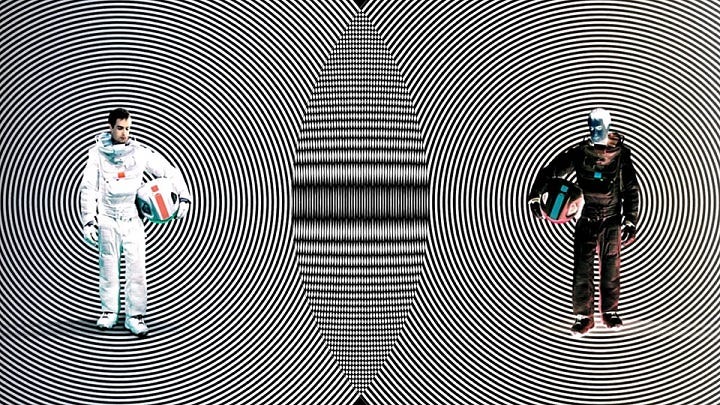






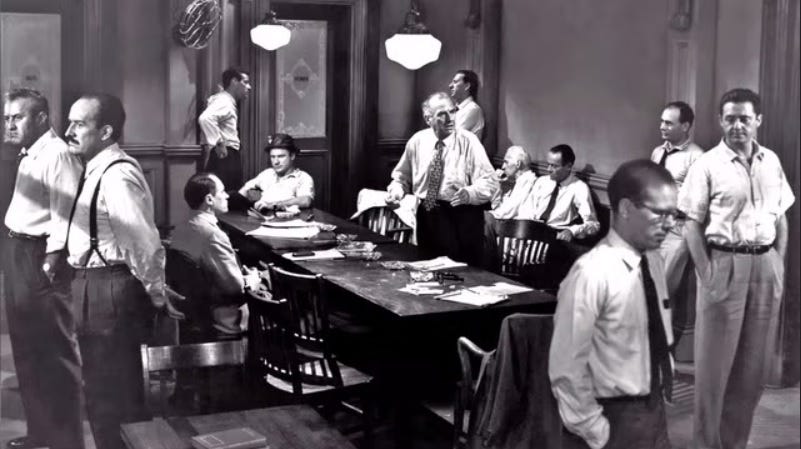
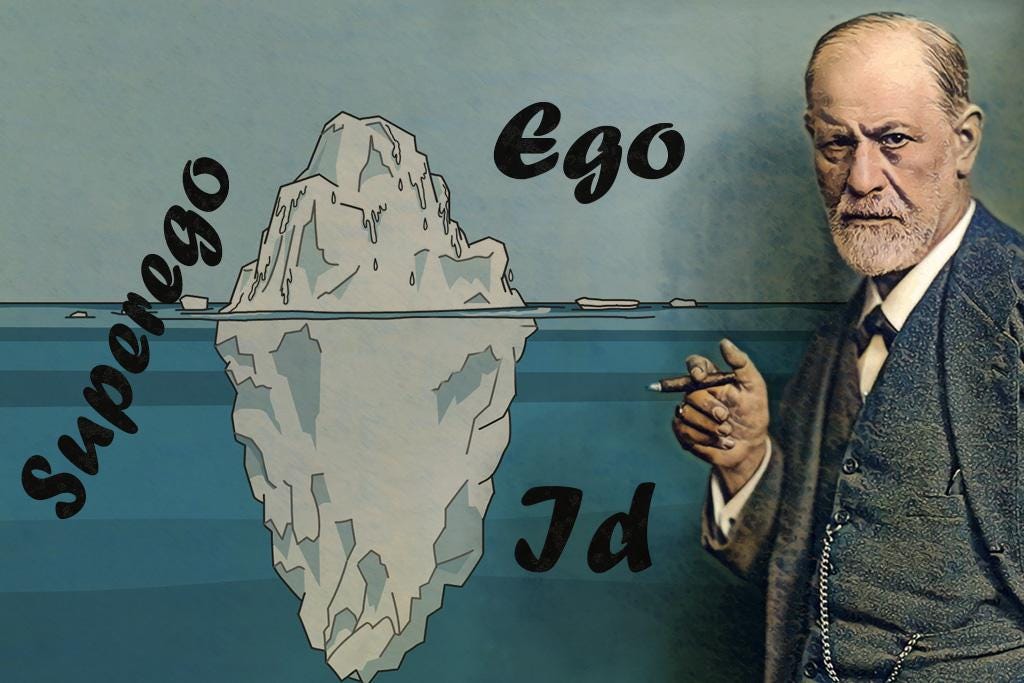
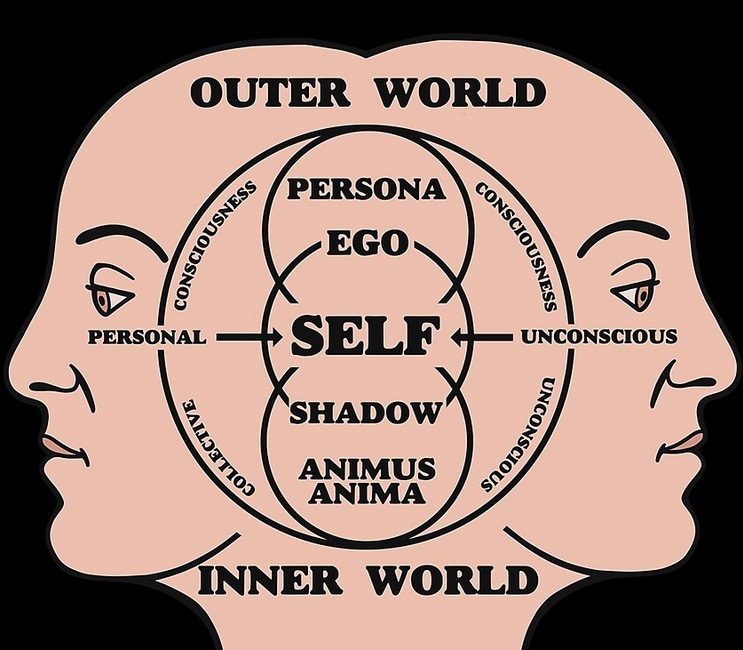



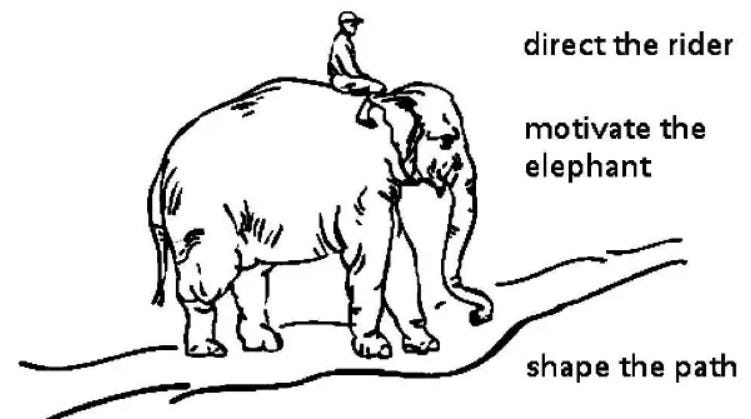
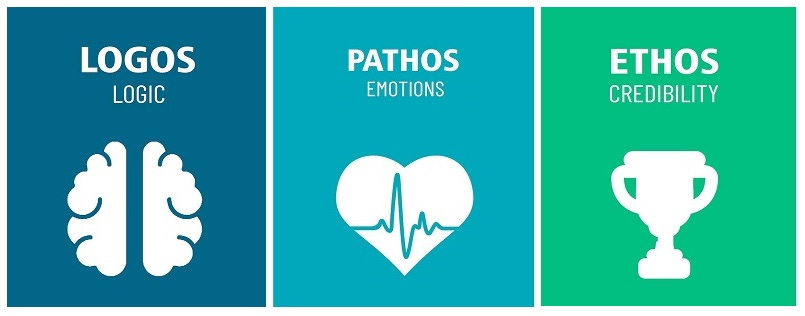

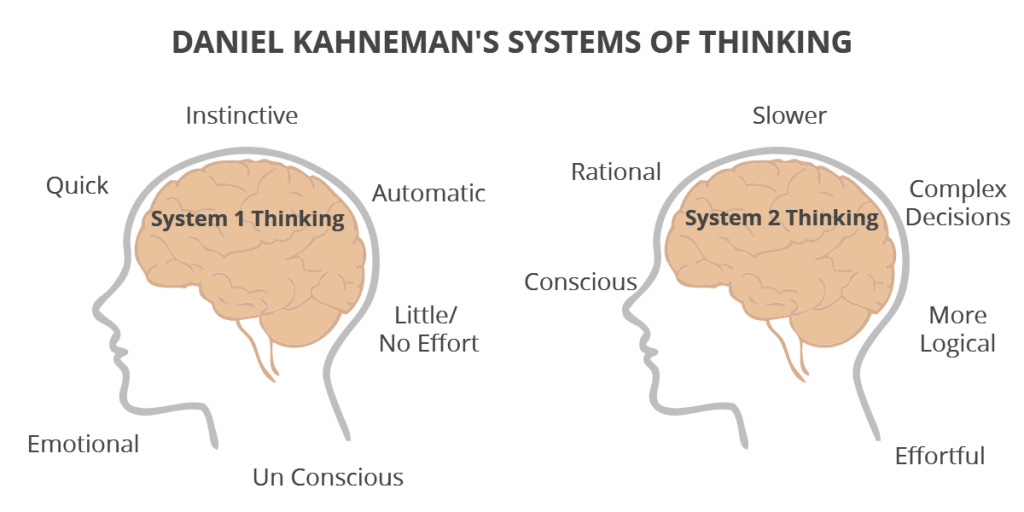

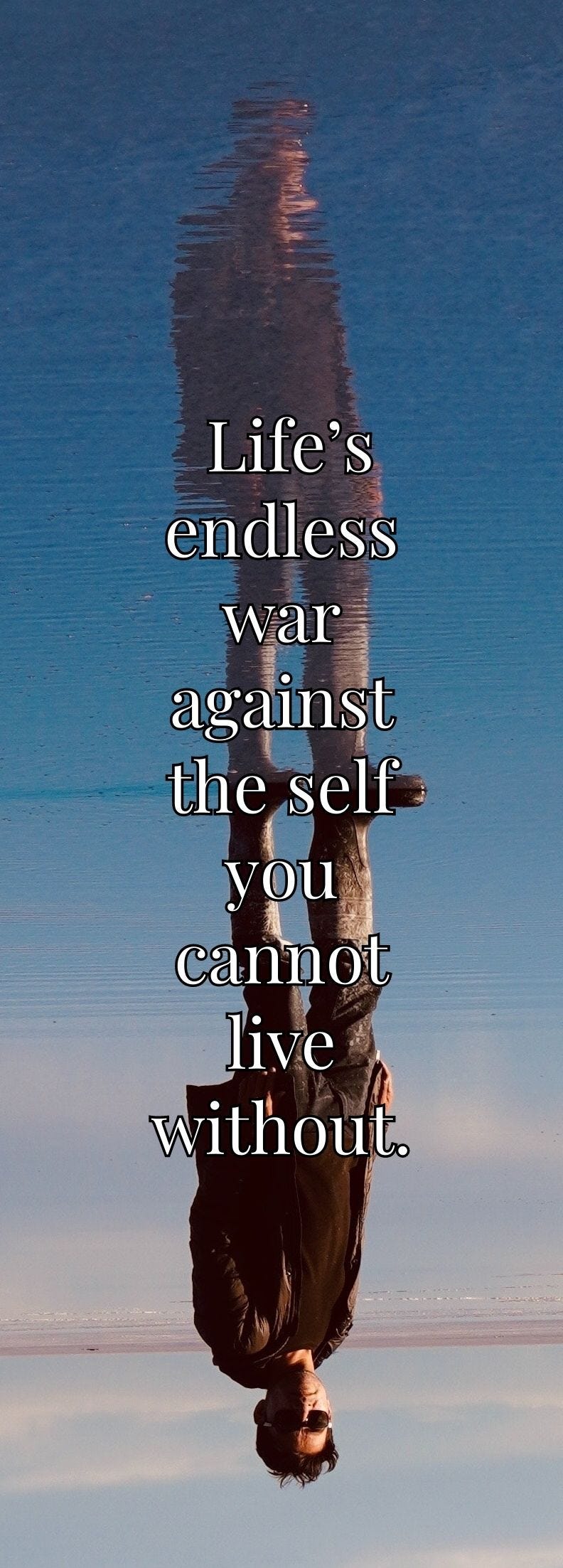
What an interesting topic, and one that you lay out so well and thoroughly. Loved the intro with Moon, such a great example.
I've been thinking about extremes and opposites, and how it's not a matter of choosing a specific one but both being able to know when to choose either, or balance them. Your points made me reflect on what has worked for me regarding this internal, accomplishing fight and came to an early conclusion that it is "Routine will set you free". Which sounds counterintuitive, but doing the same over and over gives you freedom in the sense that you remove having to decide what to do each day. And the small repetition eventually adds up to something big. Compound interest style.
Also, reading this made me think of José Saramago's The Double, have you read it? It's one of my favorite and most addictive novels, highly recommend it and very tied with identity and the both sides we all have inside.
Will continue to ruminate on this great food for thought you pose!